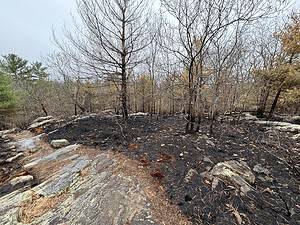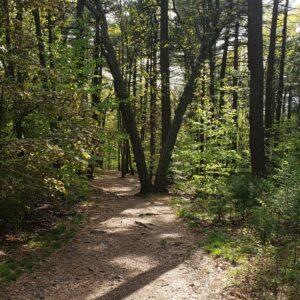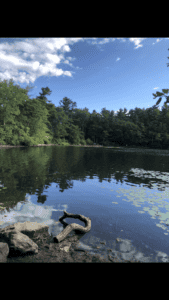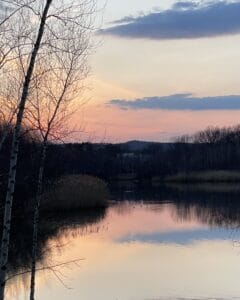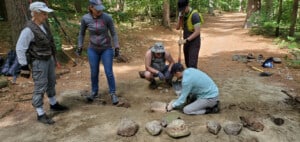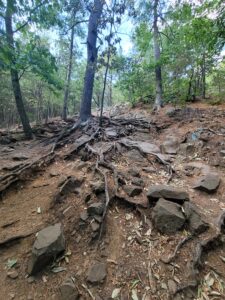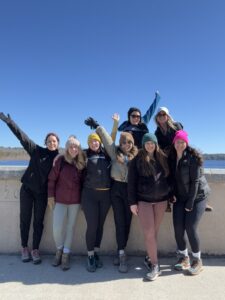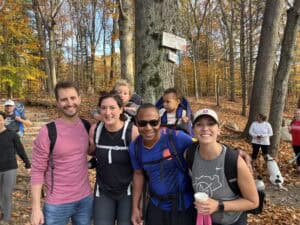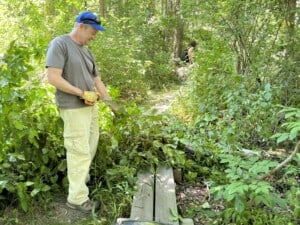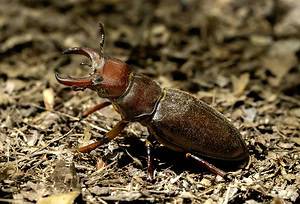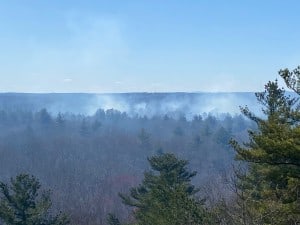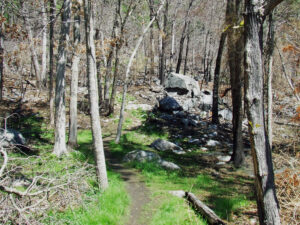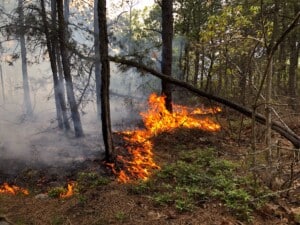Blue Hills A-Live: Brookwood Farm
A Facebook live interview with Sara Rostampour
Judy Jacobs: The Blue Hills are for more than just hiking. Today we will visit Brookwood Farm where you will learn all about the history of farming in the Blue Hills.
I’m Judy Lehrer Jacobs, the Executive Director of Friends of the Blue Hills.
Sara Rostampour: I’m Sara Rostampour. I’m the new farm manager at Brookwood Community Farm. We want to hear from you! If you have visited Brookwood or have questions about Brookwood Farm, please let us know in the comments.
You are watching Blue Hills A-Live, your weekly guide to the Blue Hills. Judy: We are grateful to our sponsor, Tom O’Neil of Success! Real Estate in Milton. He sponsors these videos every week, Thursday at noon.Share your photos! If you have photos of the Blue Hills, we’d love to see them in our photo contest. We’ll put the link in the comments below.
It’s friendsofthebluehills.org/photo-contest.
So, Sara, you’re brand new to Brookwood Farm. What’s your background that allows you to just walk into a farming job?
Sara: I started farming nine years ago, I think. I’m from Minnesota originally and was a graduate student at Cornell at the vegetable research farm. I studied things like weed science for vegetable production. It was a little colder up there, which is nice because it only gets better when you’re here. I also worked at ReVision Urban Farm in Dorchester nearby, which is how I first heard of Brookwood Community Farm. For the last four years, I worked at Land’s Sake Farm in Weston. It’s a bigger farm, more like 20 acres. It was big and complex. When I saw the opportunity to work here, it seemed perfect, with lots of community involvement.
Judy: That’s great! ReVision is also more urban. Sara: Yeah, it’s a lot smaller, less than an acre.
Judy: So, you’ve done urban and rural farming. There’s a long history at Brookwood of farming. Can you tell us a little about the history at Brookwood Farm?
Sara: Sure. It’s been here at least a couple centuries. I know that there was a general who owned the land a while ago and he had cattle and sheep, that sort of thing. Most recently, we actually met with the daughter of the man who planted most of this over here [Sara gestures behind her]. She actually lived here when it was a working farm. In one of the houses, if you go farther up the hill, it was mainly horses but it was completely a working farm. A little over 10 years ago, when Judy Lieberman [cofounder of Brookwood Community Farm] got involved in the local food movement, this land was an opportunity to bring people back to the farm again, which is nice because it’s a location that’s near Boston. There’s all these people hungry.
Judy: Actually, you just said that they didn’t grow things historically.
Sara: No, they did grow things. I think they probably grew vegetables specifically for themselves, and they grew products for the animals to eat as well. It’s part of a whole system.
Judy: And, now it’s a CSA. Do you want to talk about what that is?
Sara: CSA stands for Community Supported Agriculture. It’s a system where people support the farm by buying shares up front, by buying a share of the harvest. Every week they come in and get a little bit of what we are getting, what we are harvesting. So, they share in the risks of the farm and in the bounty of the farm. If deer come in and eat all our cucumbers, it’s going to be a little sparse for that, but on the other hand, if it’s been really sunny with perfect weather for tomatoes, then people get a lot of tomatoes. It’s kind of fun. You get more of a handle on what it’s like to grow in the area and more of a connection to your local farm and local community, as well. We also try to give people a little bit more than they pay for because it’s usually a better deal overall even though there are some fluctuations in what you get. We also grow really delicious varieties. We aren’t growing food to be sent all the way across the country; it’s for people right here.
Judy: You don’t provide food just for people right here, like local people who buy the CSAs. Where do you sell it?
Sara: We do have people signed up for a newsletter, and every so often we have a bounty of something and we will sell that. We also sell at the Roslindale Market weekly so people from that part of Boston can come. We do a lot of donations, too: I believe the Canton and Milton food pantries, Germantown and Quincy, Rosie’s Place (which is in Boston) and the Boston Area Gleaners. They can glean your coolers, but they can also glean your fields. Let’s say we have a ton of something, and no osne in the CSA wants it—like 20 pounds of cabbage—but there are people who would be happy to have it. We don’t always have the time to get to it, so the Gleaners come in and harvest it. They work with volunteers and things like that.
Judy: Is it often that fresh food goes to the food pantries?
Sara: I think that maybe more often than it used to be because we have all these local farms, like Brookwood, in the community that are distributing it. Generally, food pantries have had shelf-stable food, and not always healthy ones. The vegetables that you’d be getting would be canned: peaches in syrup or canned green beans.
Judy: Education is part of your mission at Brookwood Farm. Do you want to talk a little bit about that?
Sara: Yeah, so we do education in a variety of ways. Sometimes we have more formal programming, like with an educator. This year we don’t, but we have educational workshops that are in development that will be posted on our website plus cooking classes. Part of being a CSA member and volunteer is being educated on the food, how we grow, and practices while you’re here. Another big part is with our employees. If you think about most farms in the country, they are just grunt work. They help produce a lot, but here we are really focused on building up and educating the people that are working with us so they can continue to use that knowledge to be part of their local food source.
Ask a question! If you have any questions about Brookwood Farm or about farming in general, let us know in the comments.
Judy: There’s still snow on the ground. What’s going on here? You can’t grow in the fields yet.
Sara: Yeah, we are waiting for the snow to melt and everything to drain out, so we can get the tractors in the fields. That’s when we start. So, TBD. There’s still a ton going on our end. We have a greenhouse here, but the Bradley Estate, owned by the Trustees [of Reservations] and just a mile away, has a greenhouse. That one has heat, so there’s a lot of plants in it. We are posting on their Instagram page because a lot of what we put out here, we transplant. We start them in the greenhouse with heat, so we can get an early start. If we didn’t plant tomatoes until it was June, you wouldn’t get them until it started to freeze again. So, there’s that, there’s fixing things, there’s always a million organizational things to do, preparing for plant sales that we are going to have. There’s a lot going on.
Judy: Are you using the greenhouse here?
Sara: We do use it, but we aren’t using it yet. It’s still kind of cold, but later we’ll bring over plants before they’re ready to go out so they can get used to the fluctuating temperatures in there while still being protected from the wind. You can also use the greenhouse for curing onions and storing onions. They sit in there until they can dry out and be stored. Onions, garlic, that sort of thing. We definitely use it, but we just aren’t using it yet.
Judy: You’re not a certified organic farm, right? But, you still use organic processes? What’s the difference?
Sara: So, the organic program was formed a number of years ago as the organic food movement was becoming more predominant because there were many companies that wanted to take advantage of the labeling and the price premium. It was important to defend the integrity of that label. For smaller farms like us, it doesn’t necessarily make sense because there’s a lot of paperwork involved. It’s a good program, but here people can talk with us and they can see what we do, and we can show them exactly everything that we do. All the time and money involved in being certified doesn’t really make sense for us. But, we do follow the practices.
Judy: And, so what’s the difference? Can you give me an example?
Sara: If you’re going to spray any pesticides, they have to be as the last resort and it can only be OMRI [Organic Materials Review Institute] certified. OMRI is an institute that reviews these materials to be used only at the last resort. Some of them are simple, such as the gardening soaps. There are also things like mechanical weed control, either hand pulling or with the tractor, basically just killing them that way. We aren’t going to use any herbicides. For insects, sometimes, you’ll see what looks like white sheets in the field, and that’s row covering that we put out. It’s an exclusionary barrier to keep certain insects out. It’s much easier to keep them out than to spray toxic chemicals.
Judy: Plastic sheets?
Sara: Yeah, there’s polypropylene or some sort of material. If it’s wasn’t white out, we could walk around the farm and see the row cover that we’ve been saving and using.
Judy: And, what kind of veggies do you grow?
Sara: We grow a ton of different vegetables. Like I said, everything we grow needs to be flavorful and delicious as well as nutritious. But, we grow a lot of basics like onions and carrots and lettuce and things that people would really expect us to have. We also grow some more interesting and fancier things, like French Breakfast radishes or kohlrabi or fennel, so it gives people an opportunity to learn about a vegetable that maybe they didn’t know was really a vegetable! And there are a lot of varieties that we choose for things. You can imagine that tomatoes have a lot of different heirloom varieties.
Let’s talk veggies! If you have questions about Brookwood or about heirloom vegetables, please let us know.
Judy: Want to let us know about heirloom vegetables? Just about how they are different from others?
Sara: There’s a few different definitions. A vegetable doesn’t have to be heirloom to be good because nowadays people are breeding using some of these older varieties. But, one of the definitions is that it’s at least 40 years old or even from the 1800s. There’s different definitions like that. But the idea is that people were breeding them before they were breeding just for shipping. So, they’re supposed to be more flavorful. Every year it changes a little bit. You’re selecting for whatever is growing best in your area when you grow seeds. But, basically, they’re more flavorful vegetables.
Judy: I heard they are supposed to be more nutritious, too.
Sara: Yes, that’s often true, too.
Judy: How can people sign up for the CSA?
Sara: That’s a good question. If people go to our website, brookwoodcommunityfarm.org, there’ll be a link to where they can sign up for a CSA on our Shopify site. And, I believe there is also a link to our Instagram and Facebook pages, and they can get information there as well.
Judy: Since this is your first year, what are you looking forward to the most at Brookwood Farm?
Sara: I think I’m looking forward most to meeting all the people and all the local community members that are part of the arm and make up part of the family.
Judy: Great. I think that’s all my questions. Do you have anything else you’d like to add?
Sara: I think that if people are interested in learning more about Brookwood Farm, they can go to our website or to our Instagram page and see a lot of pretty pictures on our Facebook page. We try to put in these events or volunteer opportunities so it’s a good way to see if you want to get involved.
If you have great photos of either the farm or any place in the Blue Hills, we’d love you to submit them to our photo contest, which is free, at friendsofthebluehills.org/photo-contest. There’s a link in the comments.
Judy: Thank you. You’re watching Blue Hills A-Live, your weekly guide to the Blue Hills. We are grateful to our sponsor, Tom O’Neil of Success! Real Estate in Milton. We hope to see you next Thursday at noon when Professor Richard Primack will be talking about climate change and the Blue Hills. Thanks, and see you next Thursday.


